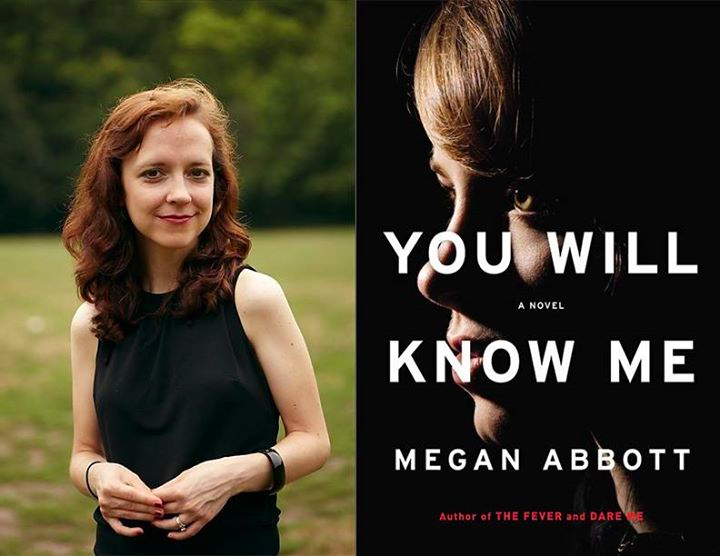Interviews
Megan Abbott on Family, Ambition and the Mystery of Gymnastics
Talking with the author of the hit thriller You Will Know Me

Just in time for the 2016 Summer Olympics, Megan Abbott has published one of her most riveting novels yet, You Will Know Me (Little Brown, 2016) set in the highly specialized and competitive world of female gymnastics. As with her most recent books — Dare Me (2012) and The Fever (2014) — You Will Know Me excels at capturing the specificities of teenage girl behavior, but the difference this time is that the teenage girls spend the bulk of their time training on vaults and high beams, rather than engaging in typical high school social activities. The result is that the attentions of these girls, and their parents, become hyper focused on the fate of their most promising gymnast, the extraordinary Devon Knox, whose skills inspire awe and envy in those around her.
You Will Know Me is told in the close third person, from the perspective of Devon’s mother, Katie Knox. As with all of the gymnasts’ families, the lives of Devon’s parents, as well as her brother Drew Knox, end up revolving around the activities and practice schedule of the ambitious athletic child. The novel opens with the hit-and-run death of a well-liked young man (and boyfriend of the niece of Devon’s coach), and the resulting fallout reveals the strength of family bonds as well as the reality of how little we can know the people who are closest to us.
I had the pleasure of interviewing Megan Abbott by email while she was on tour promoting You Will Know Me.
Catherine LaSota: Much of You Will Know Me takes place in the BelStars gymnasium, where superstar gymnast Devon and other Olympic hopefuls spend so many of their hours week in and week out. The details you include — the chalk, the grips, the parents in the stands, the sounds on the gym floor — really put me inside that space. What kind of research went into capturing this world so well? Have you always had an interest in women’s gymnastics?
Megan Abbott: Mostly as the ardent every-four-years-Olympic observer. I’d always wanted to write a book about the family of a prodigy and then, in 2012, I became particularly caught up with the Olympics, and in particular some of the attention (negative and positive) to the parents of gymnast Aly Raisman, who were this powerhouse parent team. I started to think about a novel centered on a pair of parents so devoted to their child’s talent. I started watching gymnastics obsessively, especially practices, and reading memoir after memoir — by gymnasts, former gymnasts and gymnast parents. And I started spending a lot of time in online forums devoted to parents, hearing their fears, anxieties, their pride and love.

LaSota: You have mentioned that You Will Know Me is one of your most personal works. Can you explain what you mean by that?
Abbott: In the sense that it’s about a tightknit family. I’m from a family of four and we were and remain so close, and so supportive and engaged with each other. We are no Knoxes by any stretch, and there is no prodigy among us, but I started to wonder about a family like ours if there had been. It’s also personal in the sense that it’s a book that’s about ambition, and perhaps especially female ambition — the way it’s viewed, judged. It’s something I think about a lot. During my growing-up years, girls weren’t supposed to have big ambitions — or so it felt in 1980s midwest suburbia.
LaSota: This book was especially powerful for me as a new mother. On page 28, you write, “That’s what parenthood was about, wasn’t it? Slowly understanding your child less and less until she wasn’t yours anymore but herself.” It’s interesting to think about a child growing literally inside your own body, and then one day realizing that your child’s body is completely separate from your own. You present the question of how much a parent can really “own” a child, in particular how much a parent can own, or even know, a child’s body. This is true not only in the case of Devon but also with her younger brother Drew, who grows up before his mother’s eyes over the course of the novel. I’ve noticed that the visceral pull in your novels is often due in part to the unflinching look you take at your characters’ bodies. What are your thoughts on how much character’s relationships with one another depend on their bodies’ relationships to each other?
Abbott: I confess it’s a big preoccupation with me. I think a lot about the transition between a child’s body being partially their parents and then, often quite suddenly, their own. How complicated it all is. And gymnastics is particularly compelling because of its unique demands on a growing girl’s body. If started very young, it can (though doesn’t always) stall puberty, or affect it. What does it mean for parents to be so engaged, so involved in their daughter’s sport when its very nature means it may, in some way, arrest her female development? Also, what happens when, as a fifteen year old girl, your body and your head might be in such different places? You’re stalling physical puberty, but can you stall the desires that come with it?
What does it mean for parents to be so engaged, so involved in their daughter’s sport when its very nature means it may, in some way, arrest her female development?
And I hadn’t thought about it in the case of Drew, but you’re completely right! In the novel, he’s home sick from school. He’s only eight so his mother, Katie, obviously has a different connection to the care of his body than she would if he were his sister Devon’s age (fifteen), but in many ways, he’s far further along in terms of separating himself, slipping free of the umbilical cord. Not necessarily because he wants to but because so much attention is on his sister’s body. On his sister.
LaSota: The community of gymnasts and parents is so intense in your novel because they all have a stake in each other’s destiny, especially in Devon’s path to becoming an Olympian, and the prestige this could bring to BelStars, the thrill it would bring to everyone. In the families of You Will Know Me, a sense of worth seems very much connected to achievement, and love — whether between a husband and wife, a parent and child, or in other relationships — becomes complicated and difficult to understand outside the realm of achievement. Ambition and desire come into conflict in the closest relationships of your characters. How did you develop this world to highlight these conflicts so well? Did you find that these conflicts came more naturally in the world of gymnastics, or in the socioeconomic differences between major characters, or are such conflicts of ambition and desire always present in close relationships?
Abbott: I’ve always been interested in how these dynamics play out. Growing up, I spent summers in the bleachers watching my brother play baseball and a lot of that time was watching the parents, their interactions with one another. There were always issues of class rearing up, and gender, and power. I didn’t have a plan for how that would play out in YOU WILL KNOW ME, but I knew I wanted to explore it. And I wanted Katie and Eric to be struggling financially because that’s such a keen reality with gymnastics, as with many sports. I also knew I wanted to use the BelStars parents to reflect a range of parental attitudes and dedication — from the extreme to the more conflicted. I wanted to find the ambiguity and nuance in the too-easy terms of “stage mom” or “helicopter parents.”
LaSota: Let’s talk about the title, You Will Know Me. How did you select it? In your mind, are there particular characters that are the “you” and the “me”? I think it’s such a great title, because there is so much that each of your characters does to prevent others from really knowing them fully.
Abbott: It comes from Letters to a Young Gymnast, Nadia Comaneci’s brilliant memoir. It’s written under the guise of a letter to a gymnast seeking Comaneci’s advice, so the whole book is directed to “you,” the reader. At one point, early on, she tells the reader, “I don’t know you, but you will know me.” And it just clicked for me. The force of it and, in some ways, the lie of it. Because all memoirs are in some ways lies — framed as intimate, whispered revelations to the reader when in reality they’re constructions even at their most honest. And that felt like it reflected in some way on the issues in YOU WILL KNOW ME, but it’s only since it’s been out that I’ve realized how much. I wish I could say it was planned, but it felt right more than it was a conscious choice!
LaSota: Your novels are such masterworks of suspense. What is your planning process when starting a new work? Did you map out plot points for You Will Know Me, or did you have a different approach? Did you start with certain characters in mind?
Abbott: I start with character and voice and a basic three-act idea. But I don’t plot out too much until I’m really underway. Then I tend to map out the beats just in front of me. It’s partially an organized process and partially intuitive. But it begins with nailing voice. Until I had Katie in YOU WILL KNOW ME, I had nothing. I couldn’t have written the book if I didn’t come to the moment when I heard her voice in my head.
And the suspense, if I’m honest, comes in revision. Slicing and dicing my way to the right pacing. It’s the hardest part for me.
LaSota: Were there any characters who surprised you or who changed radically from your first drafts over the course of writing You Will Know Me? Was it always your intention to write this story from the perspective of Devon’s mother, Katie, and what were your reasons for choosing this perspective?
Abbott: Yes. I toyed with switching between Katie and Eric’s perspectives, but ultimately it pulled focus. He said, she said, which left little room for Devon. But the big surprise was Drew. I meant for him to have a much more minor part — mirroring the background role he plays in the family — but I grew to adore him so much that he just demanded more attention. I had to give him more.
LaSota: There are hints of Katie’s past sprinkled throughout the novel, memories of her relationship with her own mother, but there are no detailed extended flashbacks — there is just enough information to get a sense of Katie’s background without pulling the reader out of the story at hand. How much of each character’s backstory do you have in mind when you are writing, whether or not this information actually makes its way explicitly into the novel?
Abbott: I always write at least three times the amount of backstory I can fit into a book. It’s how I discover character, so I have to do it, but in the end it’s always so painful to cut so much of it out. Painful but necessary. Whenever I’ve taught I always tell students, “You needed to write it, but you don’t need to keep it.” The few key details will matter so much more and will stand out so much more. Choosing what stays is the hard part, of course!
“You needed to write it, but you don’t need to keep it.”
LaSota: What other books, if any, were you reading while writing You Will Know Me? What books and other media do you turn to for inspiration?
Abbott: The memoirs were huge, especially Nadia Comaneci’s but also Dominique Moceanu and several others. Joan Ryan’s influential non-fiction book Little Girls in Pretty Boxes: The Making and Breaking of Elite Gymnasts and Figure Skaters. Andrew Solomon’s Far From the Tree: Parents, Children and the Search for Identity — particularly the chapters on prodigies, but really the whole book, which is beautiful and complicated. It was so important to me that I not fall into stereotype — stage moms, tennis dads, that kind of thing.
LaSota: Any thoughts on the women’s gymnastics competition in Rio this year? Do you have any special viewing plans?
Abbott: I’m on pins and needles! Like almost everyone, I’m just waiting for Simone Biles to shatter us all with her brilliance.









